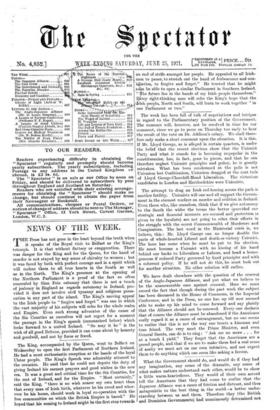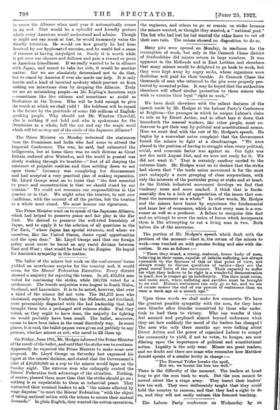What the Government should do, and would do if they
had any imagination, any sense of the dramatic, any sense of what makes nations understand each other, would be to show a little warm-heartedness. They would of their own accord tell the Americans that they had come to realize that the Japanese Alliance was a cause of friction and distrust, and thus antagonistic to the best thing in the world—a better under- standing between us and them. Therefore they (the British and Dominion Governments) had unanimously determined not to renew the Alliance when next year it automatically comes to an end. That would be a splendid and friendly gesture which every American would.understand 'and admire. Though he might not say much at first, he would immensely value the riendly intention. lie would see how greatly he had been leceived by our hyphenated enemies„ and he would feel a sense of remorse at having misjudged us. Surely it is worth while lo get over our shyness and dullness and gain a reward so great is American friendliness. If wereally wanted to be in alliance with Japan, and meant to take her side, it would be another: matter. But we are absolutely determined not to do that, but to stand; by America if ever she needs our help. It is only inertia and a kind of inverted modesty which prevent us from making our intentions clear by dropping the Alliance. Truly we are an astonishing people—as Mr. Kipling's American says —sometimes like live citizens and sometimes as stolid as Beefeaters at the Tower. Who will be bold enough to give the touch at which we shall yield ? His boldness will be repaid in the future by the gratitude of some 150 millions of English- speaking people. Why should not Mr. Winston Churchill, who is nothing if not bold and who is spokesman for the Dominions as a whole, bell the cat and say the magic word which will let us step out of the circle of the Japanese Alliance ?



































 Previous page
Previous page